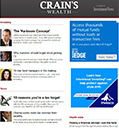New health care coverage reporting mandated by the Affordable Care Act has not caused the taxpayer headaches predicted at the beginning of the year, the country's top tax collector said Tuesday.
Internal Revenue Service Commissioner John Koskinen said he has been pleasantly surprised by the lack of confusion surrounding the requirement that Americans indicate on their returns whether they had health insurance in 2014 or received tax credits to buy it. If they chose not to purchase insurance, they have to pay a penalty.
“The filing season has gone swimmingly,” Mr. Koskinen said at a National Press Club luncheon in Washington. “The ability to implement all the new statutory requirements and changes and have the season run smoothly has surprised almost everyone.”
Advertisement
He attributed the good results to the fact that nearly 90% of Americans are now preparing or filing their taxes electronically. His agency has worked with software producers and tax preparers to make sure the systems worked.
“For the average taxpayer, the Affordable Care Act is just another item in the questions that they get asked by their software,” Mr. Koskinen said.
About 77% of taxpayers have checked the box saying they have insurance. Those seeking exemptions or paying the penalty don't appear to be having problems getting their questions answered, Mr. Koskinen said.
So far this filing season, the IRS has processed more than 82 million tax returns on the way to an expected 150 million, Mr. Koskinen said. Through March 20, the average refund checked has been $2,900. The tax deadline is April 15.
BUDGET CUTS HIT
Despite the good filing results, Mr. Koskinen said enforcement and customer service operations are suffering from budget cuts that have reduced the agency's funding by more than $1 billion over the last five years to its current total of $10.9 billion.
As it fights for more money from Congress, the IRS is making progress in curbing identity theft and refund fraud, Mr. Koskinen said. About 2,000 scammers have been jailed over the last couple years.
“We've got amateurs off the street,” Mr. Koskinen said. “We are clearly dealing with organized crime syndicates here and around the world. It is a high priority, and we'll continue to do whatever we have to do to secure taxpayer information from any threats of breach or theft.”
Suzanne Shier, chief wealth planner and tax strategist at Northern Trust, said an increasing number of her clients have fallen victim to tax-related identity theft.
“For each individual, it's a significant inconvenience,” Ms. Shier said. “It can take a fair amount of time and energy to resolve.”
Another part of the tax season that is vexing investors is the delay in information from investment funds that is required to prepare tax forms. The funds, for instance, sometimes re-characterize income from non-qualified to qualified dividends.
Robert W. Baird & Co. sent out its last original 1099s on March 16, the extended due date for delivering them to investors, and is currently preparing a batch of amended 1099s, according to Tim Steffen, director of financial planning at Baird.
If 1099s are delayed, so is filing and, as a consequence, refunds.
UNABLE TO COLLECT
“Taxpayers may have money that's owed to them, but they can't collect it yet,” Mr. Steffen said.
Marc Tannenbaum, a principal at Signature Financial Planning, would like to see the IRS institute a universal 1099 distribution deadline.
Those kinds of snafus tend to permeate the tax system. Mr. Koskinen would like to see it overhauled.
“The best thing you could do would be simplify the tax code,” Mr. Koskinen said. “It is beyond being impenetrable. I don't know how anybody understands all the ramifications of it.”









